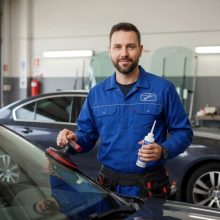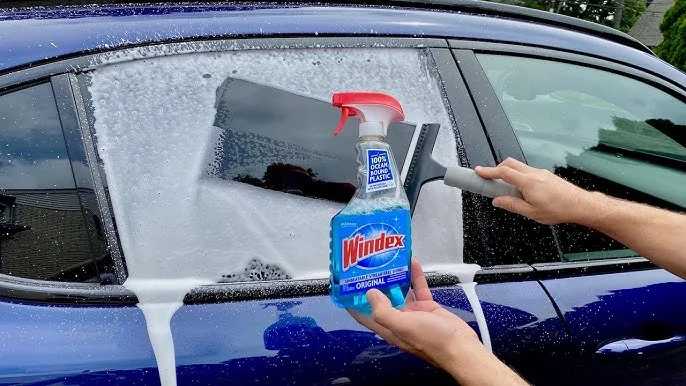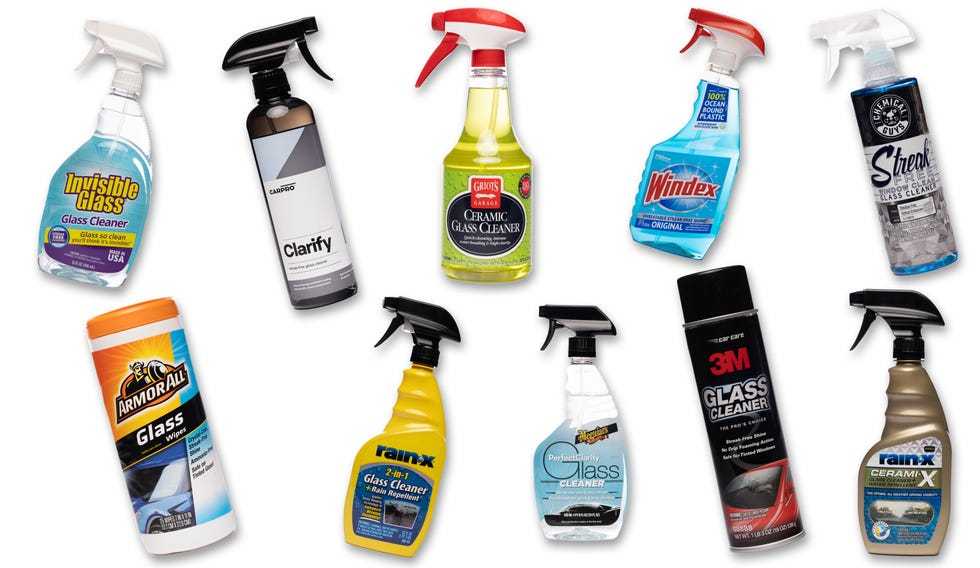Yes, you can polish car glass to restore clarity and remove scratches, but it requires the right tools and techniques to do safely and effectively. Polishing can improve visibility and give your car a fresher look, especially if your windshield or windows have minor imperfections.
Polishing car glass is possible and can be a cost-effective way to maintain clarity, but it’s important to know the proper methods to avoid damage. Using specialized glass polishing compounds and equipment, you can address light scratches and haziness, making your windows look almost new. Now, let’s dive into how to safely polish your car’s glass, the right products to use, and tips to ensure a professional finish that enhances your driving experience.
Can You Polish Car Glass?
Car glass, especially the windshield, plays a crucial role in ensuring safe driving. Over time, you might notice scratches, stains, or cloudiness that affect visibility. Many car owners ask, can you polish car glass to improve clarity and appearance. The good news is, in some cases, polishing can be effective, but there are specific factors to consider. This article explains how polishing works on car glass, what products to use, and the best methods to achieve a clear view.
Understanding Car Glass Composition
Car glass is mostly made from laminated safety glass. This glass is designed to withstand impacts and prevent shattering. The outer layer is typically tempered glass, which is more resistant to scratches but still susceptible to minor abrasions. Knowing the type of glass helps determine if polishing is suitable.
Why Does Car Glass Get Scratched?
Scratches on car glass can result from various causes:
- Washing with abrasive materials
- Rocks or debris hitting the windshield
- Using harsh cleaning tools
- Environmental factors like fallen branches or gravel roads
These scratches can impair visibility, especially during bright sunlight or at night.
Is Polishing Car Glass Safe and Effective?
Polishing can improve glass clarity but is not suitable for all types of damage. Minor scratches and stains often respond well, whereas deep chips or cracks require professional repair.
Benefits of Polishing
- Restores transparency and clarity
- Removes surface scratches
- Improves overall appearance of the glass
Limitations and Risks
- Deep scratches may not be removable
- Incorrect polishing tools can cause further damage
- Some scratches may be too deep for effective polishing
Always assess the severity of damage before attempting to polish yourself.
Tools and Materials Needed for Polishing Car Glass
Before starting, gather the right supplies to ensure a successful job.
Essential Materials
- Glass polish or scratch removal compound formulated for automotive glass
- Microfiber cloths or soft applicator pads
- Electric polishing tool or hand-held buffer (if necessary)
- Painter’s tape to protect surrounding areas
- Water spray for cleaning surface before and after polishing
Choosing the Right Products
Look for products specifically made for automotive or glass polishing. Avoid using standard household cleaners or abrasive substances, which can worsen damage.
Step-by-Step Guide to Polishing Car Glass
Follow these steps carefully for the best results.
Preparation
Start by cleaning the glass thoroughly. Use water and a gentle soap to remove dirt and debris. Dry the surface with a clean microfiber cloth.
Protect Surrounding Areas
Apply painter’s tape around the glass edges to prevent accidental scratches from tools or compounds.
Applying the Polish
Place a small amount of polish on a soft cloth or applicator pad. Gently rub in circular motions over the scratched or cloudy areas. For larger surfaces, consider using an electric buffer to maintain consistent pressure.
Buffing and Finishing
Once the polish is evenly spread, use a clean cloth to buff the area gently. Make sure to remove any residual compound for a clear, smooth surface.
Tips and Precautions for Effective Polishing
To avoid damage, keep these tips in mind.
Test on a Small Area First
Always try the polish on a hidden spot to check for adverse reactions before treating visible areas.
Use Light Pressure
Applying excessive force can scratch or damage the glass further. Gentle, consistent pressure yields better results.
Avoid Over-polishing
Repeated polishing can weaken the glass surface or cause new scratches. Limit the process to a few passes.
Regular Maintenance
Clean your windshield regularly using non-abrasive cleaners to prevent buildup of grime and scratches.
When to Seek Professional Help
If damage is extensive or deep, DIY polishing may not be enough. Cracks, large chips, or deep scratches need professional repair. Experts can assess whether polishing is appropriate or if glass replacement is necessary.
Signs You Need a Professional
- Cracks longer than a few inches
- Deep scratches that catch your fingernail
- Multiple scratches clustered together
- Cloudiness caused by internal damage or contamination
Additional Tips for Maintaining Clear Car Glass
Good maintenance practices help keep your glass looking new.
Clean Regularly
Use a glass cleaner suitable for automotive surfaces and soft cloths.
Avoid Abrasive Cleaning Tools
Never scrub with rough sponges or brushes that can scratch the surface.
Protect Your Glass
Park in shaded areas and use sunshades to minimize UV damage that can cause glass deterioration.
Address Damage Promptly
Treat scratches or chips early before they worsen and become harder to fix.
Related Topics to Explore
- How to choose the best windshield repair kit
- DIY vs professional car glass repair
- Tips for cleaning and maintaining car windows
- Signs that your windshield needs replacement
- Best products for removing tough stains from car glass
Polishing car glass is a practical way to improve visibility and appearance if scratches or cloudiness are minor. Remember, proper tools, gentle techniques, and patience are key to achieving the best results. For larger or deeper damage, consulting a professional ensures safety and the longevity of your windshield.
HOW TO POLISH AND CERAMIC COAT CAR GLASS !!
Frequently Asked Questions
Can professional car glass polishing improve visibility on scratched windows?
Yes, professional car glass polishing can significantly improve visibility by removing minor scratches, water spots, and haziness on the surface of the glass. Skilled technicians use specialized equipment and polishing compounds to restore clarity, making driving safer and more comfortable. However, deeper cracks or chips may require replacement instead of polishing.
Is it possible to restore cloudy or foggy car windows through polishing?
Polishing can effectively clear up cloudy or foggy windows caused by embedded dirt, mineral deposits, or surface oxidation. By carefully polishing the glass, technicians can restore its transparency and improve overall appearance. Keep in mind that persistent internal fogging or severe damage might need additional treatments or window replacement.
What types of damage can be addressed with car glass polishing?
Car glass polishing can handle minor surface imperfections such as light scratches, water stains, and haze caused by environmental factors. It can also remove slight etching or corrosion. However, it cannot repair large cracks, chips, or heavily damaged areas, which generally require professional replacement of the glass.
Does polishing car glass affect the integrity of the window?
When performed correctly by professionals, polishing does not compromise the structural integrity of the glass. Instead, it refines the surface, removing superficial damage without weakening the material. It’s important to use proper techniques and quality equipment to ensure the safety and durability of the glass.
How often should I consider polishing my car’s glass?
It is advisable to have your car glass polished whenever you notice a decline in visibility due to surface damage or haziness. Regular maintenance, combined with proper cleaning, helps preserve the clarity of the windows and prevents the buildup of scratches or stains that can obscure your view over time.
Final Thoughts
Polishing car glass can restore clarity and improve visibility, making your driving safer. Using the right products and techniques is essential for effective results.
You can polish car glass at home with a glass cleaner, a polishing compound, and a soft cloth. Avoid harsh abrasives that could scratch the surface or cause more damage.
In summary, can you polish car glass? Yes, you can, and it offers a simple way to maintain your vehicle’s appearance. Proper polishing enhances clarity and safety without professional help.



